Deck 4: Limits and Their Properties
Question
Question
Question
Question
Question
Question
Question
Question
Question
Question
Question
Question
Question
Question
Question
Question
Question
Question
Question
Question
Question
Question
Question
Question
Question
Question
Question
Question
Question
Question
Question
Question
Question
Question
Question
Question
Question
Question
Question
Question
Question
Question
Question
Question
Question
Question
Question
Question
Question
Question
Question

Unlock Deck
Sign up to unlock the cards in this deck!
Unlock Deck
Unlock Deck
1/51
Play
Full screen (f)
Deck 4: Limits and Their Properties
1
Determine the following limit. (Hint: Use the graph to calculate the limit.) 
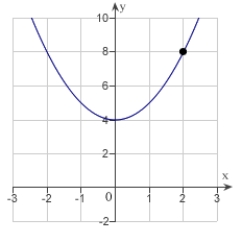
A)does not exist
B)2
C)4
D)8
E)0


A)does not exist
B)2
C)4
D)8
E)0
8
2
Let  and
and  . Find the limit.
. Find the limit. 
A)
B)
C)
D)
E)
 and
and  . Find the limit.
. Find the limit. 
A)

B)

C)

D)

E)


3
Suppose that  and
and  . Find the following limit.
. Find the following limit. 
A)140
B)-4
C)0
D)-24
E)-10
 and
and  . Find the following limit.
. Find the following limit. 
A)140
B)-4
C)0
D)-24
E)-10
-24
4
Suppose that  and
and  . Find the following limit.
. Find the following limit. 
A)4
B)-1
C)9
D)-20
E)5
 and
and  . Find the following limit.
. Find the following limit. 
A)4
B)-1
C)9
D)-20
E)5

Unlock Deck
Unlock for access to all 51 flashcards in this deck.
Unlock Deck
k this deck
5
Find the limit. 
A)
B)
C)
D)
E)

A)

B)

C)

D)

E)


Unlock Deck
Unlock for access to all 51 flashcards in this deck.
Unlock Deck
k this deck
6
Find the limit. 
A)-5
B)50
C)-50
D)5
E)20

A)-5
B)50
C)-50
D)5
E)20

Unlock Deck
Unlock for access to all 51 flashcards in this deck.
Unlock Deck
k this deck
7
Let  .Determine the following limit. (Hint: Use the graph to calculate the limit.)
.Determine the following limit. (Hint: Use the graph to calculate the limit.) 
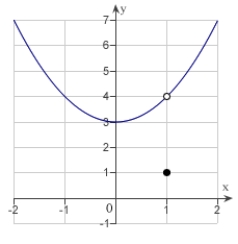
A)4
B)1
C)3
D)9
E)does not exist.
 .Determine the following limit. (Hint: Use the graph to calculate the limit.)
.Determine the following limit. (Hint: Use the graph to calculate the limit.) 

A)4
B)1
C)3
D)9
E)does not exist.

Unlock Deck
Unlock for access to all 51 flashcards in this deck.
Unlock Deck
k this deck
8
Determine the following limit. (Hint: Use the graph to calculate the limit.) 
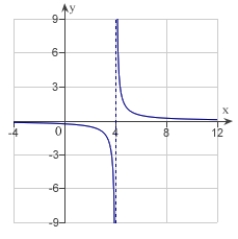
A)0
B)does not exist
C)4
D)-4
E)-8


A)0
B)does not exist
C)4
D)-4
E)-8

Unlock Deck
Unlock for access to all 51 flashcards in this deck.
Unlock Deck
k this deck
9
Suppose that  and
and  . Find the following limit.
. Find the following limit. 
A)
B)-63
C)
D)does not exist.
E)63
 and
and  . Find the following limit.
. Find the following limit. 
A)

B)-63
C)

D)does not exist.
E)63

Unlock Deck
Unlock for access to all 51 flashcards in this deck.
Unlock Deck
k this deck
10
Suppose that  . Find the following limit.
. Find the following limit. 
A)-2
B)4
C)0
D)3
E)1
 . Find the following limit.
. Find the following limit. 
A)-2
B)4
C)0
D)3
E)1

Unlock Deck
Unlock for access to all 51 flashcards in this deck.
Unlock Deck
k this deck
11
Determine the following limit. (Hint: Use the graph to calculate the limit.) 
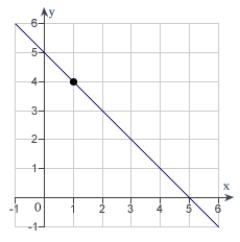
A)6
B)5
C)1
D)4
E)does not exist


A)6
B)5
C)1
D)4
E)does not exist

Unlock Deck
Unlock for access to all 51 flashcards in this deck.
Unlock Deck
k this deck
12
Decide whether the following problem can be solved using precalculus, or whether calculus is required. If the problem can be solved using precalculus, solve it. If the problem seems to require calculus, use a graphical or numerical approach to estimate the solution.Find the distance traveled in 14 seconds by an object traveling at a constant velocity of 12 feet per second.
A)precalculus , 336 ft
B)precalculus , 168 ft
C)calculus , 168 ft
D)calculus , 336 ft
E)calculus , 188 ft
A)precalculus , 336 ft
B)precalculus , 168 ft
C)calculus , 168 ft
D)calculus , 336 ft
E)calculus , 188 ft

Unlock Deck
Unlock for access to all 51 flashcards in this deck.
Unlock Deck
k this deck
13
Decide whether the following problem can be solved using precalculus, or whether calculus is required. If the problem can be solved using precalculus, solve it. If the problem seems to require calculus, use a graphical or numerical approach to estimate the solution.A cyclist is riding on a path whose elevation is modeled by the function  where x and
where x and  are measured in miles. Find the rate of change of elevation when x = 4.5.
are measured in miles. Find the rate of change of elevation when x = 4.5. 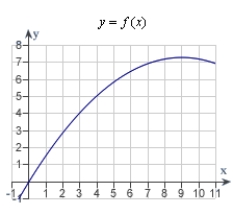
A)calculus , 0.21
B)calculus , 0.09
C)precalculus , 0.21
D)precalculus , 0.09
E)calculus , 0.81
 where x and
where x and  are measured in miles. Find the rate of change of elevation when x = 4.5.
are measured in miles. Find the rate of change of elevation when x = 4.5. 
A)calculus , 0.21
B)calculus , 0.09
C)precalculus , 0.21
D)precalculus , 0.09
E)calculus , 0.81

Unlock Deck
Unlock for access to all 51 flashcards in this deck.
Unlock Deck
k this deck
14
Decide whether the following problem can be solved using precalculus, or whether calculus is required. If the problem can be solved using precalculus, solve it. If the problem seems to require calculus, use a graphical or numerical approach to estimate the solution.Find the area of the shaded region bounded by the triangle with vertices (0,0), (7,8), (15,0). 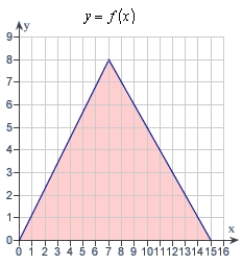
A)precalculus , 60.0
B)precalculus , 120.0
C)calculus , 180.0
D)calculus , 120.0
E)precalculus , 180.0

A)precalculus , 60.0
B)precalculus , 120.0
C)calculus , 180.0
D)calculus , 120.0
E)precalculus , 180.0

Unlock Deck
Unlock for access to all 51 flashcards in this deck.
Unlock Deck
k this deck
15
Let  and
and  . Find the limit.
. Find the limit. 
A)-17
B)27
C)103
D)-125
E)343
 and
and  . Find the limit.
. Find the limit. 
A)-17
B)27
C)103
D)-125
E)343

Unlock Deck
Unlock for access to all 51 flashcards in this deck.
Unlock Deck
k this deck
16
Decide whether the following problem can be solved using precalculus, or whether calculus is required. If the problem can be solved using precalculus, solve it. If the problem seems to require calculus, use a graphical or numerical approach to estimate the solution.A cyclist is riding on a path whose elevation is modeled by the function  where x and
where x and  are measured in miles. Find the rate of change of elevation when x = 4.0.
are measured in miles. Find the rate of change of elevation when x = 4.0. 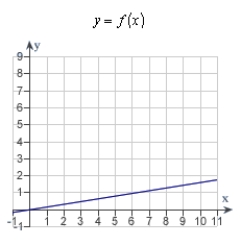
A)calculus , 1.28
B)precalculus , 1.28
C)calculus , 0.16
D)precalculus , 0.16
E)precalculus , 0.41
 where x and
where x and  are measured in miles. Find the rate of change of elevation when x = 4.0.
are measured in miles. Find the rate of change of elevation when x = 4.0. 
A)calculus , 1.28
B)precalculus , 1.28
C)calculus , 0.16
D)precalculus , 0.16
E)precalculus , 0.41

Unlock Deck
Unlock for access to all 51 flashcards in this deck.
Unlock Deck
k this deck
17
Let  .Determine the following limit. (Hint: Use the graph to calculate the limit.)
.Determine the following limit. (Hint: Use the graph to calculate the limit.) 
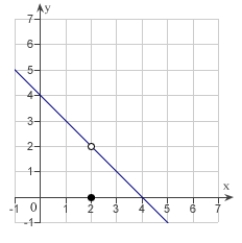
A)2
B)0
C)4
D)6
E)does not exist
 .Determine the following limit. (Hint: Use the graph to calculate the limit.)
.Determine the following limit. (Hint: Use the graph to calculate the limit.) 

A)2
B)0
C)4
D)6
E)does not exist

Unlock Deck
Unlock for access to all 51 flashcards in this deck.
Unlock Deck
k this deck
18
Decide whether the following problem can be solved using precalculus, or whether calculus is required. If the problem can be solved using precalculus, solve it. If the problem seems to require calculus, use a graphical or numerical approach to estimate the solution.Find the distance traveled in 17 seconds by an object moving with a velocity of  feet per second.
feet per second.
A)precalculus , 168.0772 ft
B)calculus , 169.4497 ft
C)calculus , 168.0772 ft
D)precalculus , 169.4497 ft
E)precalculus , 170.7997 ft
 feet per second.
feet per second.A)precalculus , 168.0772 ft
B)calculus , 169.4497 ft
C)calculus , 168.0772 ft
D)precalculus , 169.4497 ft
E)precalculus , 170.7997 ft

Unlock Deck
Unlock for access to all 51 flashcards in this deck.
Unlock Deck
k this deck
19
Find the limit. 
A)
B)0
C)
D)
E)

A)

B)0
C)

D)

E)


Unlock Deck
Unlock for access to all 51 flashcards in this deck.
Unlock Deck
k this deck
20
Let  and
and  . Find the limits:
. Find the limits: 
A)
B)
C)
D)
E)
 and
and  . Find the limits:
. Find the limits: 
A)

B)

C)

D)

E)


Unlock Deck
Unlock for access to all 51 flashcards in this deck.
Unlock Deck
k this deck
21
Find the limit (if it exists). 
A)
B)1
C)0
D)
E)Limit does not exist.

A)

B)1
C)0
D)

E)Limit does not exist.

Unlock Deck
Unlock for access to all 51 flashcards in this deck.
Unlock Deck
k this deck
22
Suppose that  . Find the following limit.
. Find the following limit. 
A)26
B)-2
C)-13
D)-13c
E)-26
 . Find the following limit.
. Find the following limit. 
A)26
B)-2
C)-13
D)-13c
E)-26

Unlock Deck
Unlock for access to all 51 flashcards in this deck.
Unlock Deck
k this deck
23
Find constants a and b such that the function  is continuous on the entire real line.
is continuous on the entire real line.
A)a = 1 , b = 0
B)a = 1 , b = 3
C)a = 1 , b = -3
D)a = -1 , b = -3
E)a = -1 , b = 3
 is continuous on the entire real line.
is continuous on the entire real line.A)a = 1 , b = 0
B)a = 1 , b = 3
C)a = 1 , b = -3
D)a = -1 , b = -3
E)a = -1 , b = 3

Unlock Deck
Unlock for access to all 51 flashcards in this deck.
Unlock Deck
k this deck
24
Use the graph to determine the following limits, and discuss the continuity of the function at  .(i)
.(i)  (ii)
(ii)  (iii)
(iii) 
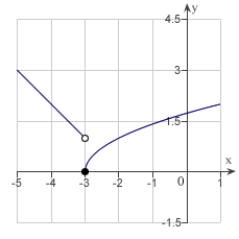
A)1 , 0 , does not exist , not continuous
B)0 , 1 , does not exist , not continuous
C)0 , 1 , 0 , continuous
D)-3 , 0 , does not exist , not continuous
E)1 , -1 , does not exist , not continuous
 .(i)
.(i)  (ii)
(ii)  (iii)
(iii) 

A)1 , 0 , does not exist , not continuous
B)0 , 1 , does not exist , not continuous
C)0 , 1 , 0 , continuous
D)-3 , 0 , does not exist , not continuous
E)1 , -1 , does not exist , not continuous

Unlock Deck
Unlock for access to all 51 flashcards in this deck.
Unlock Deck
k this deck
25
Find the limit (if it exists). Note that  represents the greatest integer function.
represents the greatest integer function. 
A)17
B)15
C)0
D)16
E)Limit does not exist.
 represents the greatest integer function.
represents the greatest integer function. 
A)17
B)15
C)0
D)16
E)Limit does not exist.

Unlock Deck
Unlock for access to all 51 flashcards in this deck.
Unlock Deck
k this deck
26
Find the limit (if it exists).  where
where 
A)10
B)0
C)27
D)9
E)Limit does not exist.
 where
where 
A)10
B)0
C)27
D)9
E)Limit does not exist.

Unlock Deck
Unlock for access to all 51 flashcards in this deck.
Unlock Deck
k this deck
27
Use the graph as shown to determine the following limits, and discuss the continuity of the function at  .(i)
.(i)  (ii)
(ii)  (iii)
(iii) 
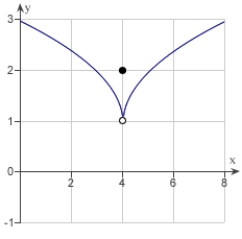
A)4 , 4, 4, not continuous
B)2 , 2 , 2 , not continuous
C)1 , 1 , 1 , continuous
D)2 , 2 , 2 , continuous
E)1 , 1 , 1 , not continuous
 .(i)
.(i)  (ii)
(ii)  (iii)
(iii) 

A)4 , 4, 4, not continuous
B)2 , 2 , 2 , not continuous
C)1 , 1 , 1 , continuous
D)2 , 2 , 2 , continuous
E)1 , 1 , 1 , not continuous

Unlock Deck
Unlock for access to all 51 flashcards in this deck.
Unlock Deck
k this deck
28
Find the limit (if it exists). 
A)
B)0
C)
D)
E)Limit does not exist.

A)

B)0
C)

D)

E)Limit does not exist.

Unlock Deck
Unlock for access to all 51 flashcards in this deck.
Unlock Deck
k this deck
29
Find the limit (if it exists). 
A)
B)0
C)
D)
E)Limit does not exist.

A)

B)0
C)

D)

E)Limit does not exist.

Unlock Deck
Unlock for access to all 51 flashcards in this deck.
Unlock Deck
k this deck
30
Find the limit (if it exists). 
A)
B)
C)does not exist
D)
E)

A)

B)

C)does not exist
D)

E)


Unlock Deck
Unlock for access to all 51 flashcards in this deck.
Unlock Deck
k this deck
31
Find the limit (if it exists). Note that  represents the greatest integer function.
represents the greatest integer function. 
A)-11
B)10
C)does not exist
D)11
E)-10
 represents the greatest integer function.
represents the greatest integer function. 
A)-11
B)10
C)does not exist
D)11
E)-10

Unlock Deck
Unlock for access to all 51 flashcards in this deck.
Unlock Deck
k this deck
32
Find the limit (if it exists): 

A)-32
B)
C)
D)8
E)


A)-32
B)

C)

D)8
E)


Unlock Deck
Unlock for access to all 51 flashcards in this deck.
Unlock Deck
k this deck
33
Use the graph as shown to determine the following limits, and discuss the continuity of the function at  .(i)
.(i)  (ii)
(ii)  (iii)
(iii) 
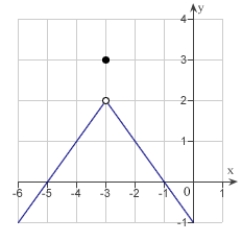
A)2 , 2 , 2 , not continuous
B)2 , 2 , 2 , continuous
C)3 , 3 , 3 , not continuous
D)3 , 3 , 3 , continuous
E)-3 , -3 , -3 , continuous
 .(i)
.(i)  (ii)
(ii)  (iii)
(iii) 

A)2 , 2 , 2 , not continuous
B)2 , 2 , 2 , continuous
C)3 , 3 , 3 , not continuous
D)3 , 3 , 3 , continuous
E)-3 , -3 , -3 , continuous

Unlock Deck
Unlock for access to all 51 flashcards in this deck.
Unlock Deck
k this deck
34
Find the following limit (if it exists). Write a simpler function that agrees with the given function at all but one point. 
A)does not exist
B)74
C)-74
D)-80
E)80

A)does not exist
B)74
C)-74
D)-80
E)80

Unlock Deck
Unlock for access to all 51 flashcards in this deck.
Unlock Deck
k this deck
35
Discuss the continuity of the function  .
. 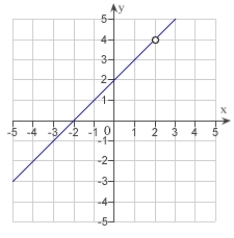
A) is continuous for all real x.
is continuous for all real x.
B) is discontinuous at
is discontinuous at  .
.
C) is discontinuous at
is discontinuous at  .
.
D) is discontinuous at
is discontinuous at  .
.
E) is continuous at
is continuous at  .
.
 .
. 
A)
 is continuous for all real x.
is continuous for all real x.B)
 is discontinuous at
is discontinuous at  .
.C)
 is discontinuous at
is discontinuous at  .
.D)
 is discontinuous at
is discontinuous at  .
.E)
 is continuous at
is continuous at  .
.
Unlock Deck
Unlock for access to all 51 flashcards in this deck.
Unlock Deck
k this deck
36
Find the x-values (if any) at which  is not continuous.
is not continuous.
A) is continuous for all real x.
is continuous for all real x.
B) is not continuous at
is not continuous at  and both the discontinuities are nonremovable.
and both the discontinuities are nonremovable.
C) is not continuous only at
is not continuous only at  and
and  has a removable discontinuity at
has a removable discontinuity at  .
.
D) is not continuous only at
is not continuous only at  and
and  has a removable discontinuity at
has a removable discontinuity at  .
.
E) is not continuous at
is not continuous at  and
and  has a removable discontinuity at
has a removable discontinuity at  .
.
 is not continuous.
is not continuous.A)
 is continuous for all real x.
is continuous for all real x.B)
 is not continuous at
is not continuous at  and both the discontinuities are nonremovable.
and both the discontinuities are nonremovable.C)
 is not continuous only at
is not continuous only at  and
and  has a removable discontinuity at
has a removable discontinuity at  .
.D)
 is not continuous only at
is not continuous only at  and
and  has a removable discontinuity at
has a removable discontinuity at  .
.E)
 is not continuous at
is not continuous at  and
and  has a removable discontinuity at
has a removable discontinuity at  .
.
Unlock Deck
Unlock for access to all 51 flashcards in this deck.
Unlock Deck
k this deck
37
Find the x-values (if any) at which the function  is not continuous. Which of the discontinuities are removable?
is not continuous. Which of the discontinuities are removable?
A)no points of discontinuity.
B) (not removable),
(not removable),  (removable)
(removable)
C) (removable),
(removable),  (not removable)
(not removable)
D)no points of continuity.
E) (not removable),
(not removable),  (not removable)
(not removable)
 is not continuous. Which of the discontinuities are removable?
is not continuous. Which of the discontinuities are removable?A)no points of discontinuity.
B)
 (not removable),
(not removable),  (removable)
(removable)C)
 (removable),
(removable),  (not removable)
(not removable)D)no points of continuity.
E)
 (not removable),
(not removable),  (not removable)
(not removable)
Unlock Deck
Unlock for access to all 51 flashcards in this deck.
Unlock Deck
k this deck
38
Find the x-values (if any) at which the function  is not continuous. Which of the discontinuities are removable?
is not continuous. Which of the discontinuities are removable?
A)continuous everywhere
B) , removable
, removable
C) , removable.
, removable.
D) , not removable.
, not removable.
E)x = 0, removable
 is not continuous. Which of the discontinuities are removable?
is not continuous. Which of the discontinuities are removable?A)continuous everywhere
B)
 , removable
, removableC)
 , removable.
, removable.D)
 , not removable.
, not removable.E)x = 0, removable

Unlock Deck
Unlock for access to all 51 flashcards in this deck.
Unlock Deck
k this deck
39
Find the x-values (if any) at which the function  is not continuous. Which of the discontinuities are removable?
is not continuous. Which of the discontinuities are removable?
A)3 and -3, not removable.
B)continuous everywhere
C)3 and -3, removable.
D)discontinuous everywhere
E)0, removable
 is not continuous. Which of the discontinuities are removable?
is not continuous. Which of the discontinuities are removable?A)3 and -3, not removable.
B)continuous everywhere
C)3 and -3, removable.
D)discontinuous everywhere
E)0, removable

Unlock Deck
Unlock for access to all 51 flashcards in this deck.
Unlock Deck
k this deck
40
Find the value of c guaranteed by the Intermediate Value Theorem.  .
.
A)3
B)2
C)5
D)7
E)6
 .
.A)3
B)2
C)5
D)7
E)6

Unlock Deck
Unlock for access to all 51 flashcards in this deck.
Unlock Deck
k this deck
41
Find all the vertical asymptotes (if any) of the graph of the function  .
.
A)
B)
C)
D)
E)no vertical asymptotes.
 .
.A)

B)

C)

D)

E)no vertical asymptotes.

Unlock Deck
Unlock for access to all 51 flashcards in this deck.
Unlock Deck
k this deck
42
Find all the vertical asymptotes (if any) of the graph of the function  .
.
A)
B)
C)
D)
E)no vertical asymptotes.
 .
.A)

B)

C)

D)

E)no vertical asymptotes.

Unlock Deck
Unlock for access to all 51 flashcards in this deck.
Unlock Deck
k this deck
43
Find the limit. 
A)0
B)
C)1
D)-1
E)

A)0
B)

C)1
D)-1
E)


Unlock Deck
Unlock for access to all 51 flashcards in this deck.
Unlock Deck
k this deck
44
Use a graphing utility to graph the function  and determine the one-sided limit
and determine the one-sided limit  .
.
A)
B)
C)0
D)12
E)8
 and determine the one-sided limit
and determine the one-sided limit  .
.A)

B)

C)0
D)12
E)8

Unlock Deck
Unlock for access to all 51 flashcards in this deck.
Unlock Deck
k this deck
45
Find the value of c guaranteed by the Intermediate Value Theorem.  .
.
A)4
B)3
C)10
D)11
E)9
 .
.A)4
B)3
C)10
D)11
E)9

Unlock Deck
Unlock for access to all 51 flashcards in this deck.
Unlock Deck
k this deck
46
Find the limit. 
A)-26
B)
C)26
D)
E)13

A)-26
B)

C)26
D)

E)13

Unlock Deck
Unlock for access to all 51 flashcards in this deck.
Unlock Deck
k this deck
47
Find all vertical asymptotes (if any) of the function  .
.
A)x = 4, 3, -6
B)x = 3
C)x = -4, -3
D)x = -3
E)x = 4, 3
 .
.A)x = 4, 3, -6
B)x = 3
C)x = -4, -3
D)x = -3
E)x = 4, 3

Unlock Deck
Unlock for access to all 51 flashcards in this deck.
Unlock Deck
k this deck
48
Find the limit. 
A)
B)
C)0
D)-1
E)1

A)

B)

C)0
D)-1
E)1

Unlock Deck
Unlock for access to all 51 flashcards in this deck.
Unlock Deck
k this deck
49
Find the vertical asymptotes (if any) of the function  .
.
A)x = 4
B)x = -4
C)x = 3
D)x = -3
E)x = 12
 .
.A)x = 4
B)x = -4
C)x = 3
D)x = -3
E)x = 12

Unlock Deck
Unlock for access to all 51 flashcards in this deck.
Unlock Deck
k this deck
50
A 25-foot ladder is leaning against a house (see figure). If the base of the ladder is pulled away from the house at a rate of 2 feet per second, the top will move down the wall at a rate of  where x is the distance between the base of the ladder and the house. Find the rate r when x is 20 feet.
where x is the distance between the base of the ladder and the house. Find the rate r when x is 20 feet. 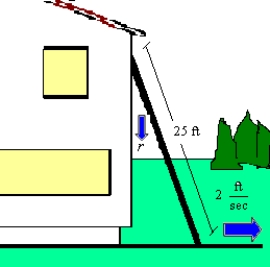
A)
B)
C)
D)
E)
 where x is the distance between the base of the ladder and the house. Find the rate r when x is 20 feet.
where x is the distance between the base of the ladder and the house. Find the rate r when x is 20 feet. 
A)

B)

C)

D)

E)


Unlock Deck
Unlock for access to all 51 flashcards in this deck.
Unlock Deck
k this deck
51
A 35-foot ladder is leaning against a house (see figure). If the base of the ladder is pulled away from the house at a rate of 2 feet per second, the top will move down the wall at a rate of  where x is the distance between the base of the ladder and the house. Find the limit of r as
where x is the distance between the base of the ladder and the house. Find the limit of r as  .
. 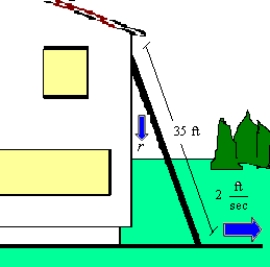
A)
B)70
C)0
D)35
E)
 where x is the distance between the base of the ladder and the house. Find the limit of r as
where x is the distance between the base of the ladder and the house. Find the limit of r as  .
. 
A)

B)70
C)0
D)35
E)


Unlock Deck
Unlock for access to all 51 flashcards in this deck.
Unlock Deck
k this deck


